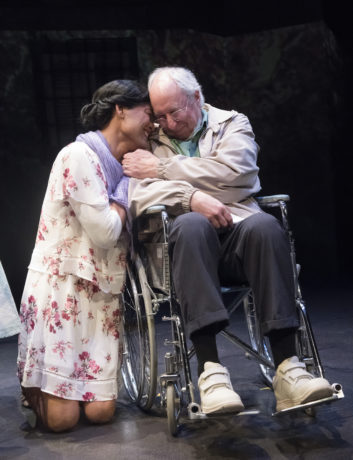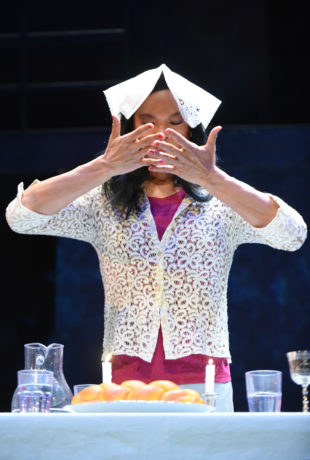Paper Dolls, the bittersweet new musical that opened at Mosaic Theater Company two weeks ago, has produced standing ovations—and laughter and tears—at every production so far.

Yet the show, which broke all records for pre-opening sales and is already one of the top box office successes in Mosaic’s history, is about a situation so improbable that even a simple description sounds like a joke.
Think about it. This is a play in which five gay male Filipinos in Tel Aviv care for elderly Jews six days a week and then perform as drag queens on the seventh. They are billed as the ‘Paper Dolls’ because their costumes are made of pleated newspapers.
It’s a situation so far beyond the realm of our experience that it sounds like a fairy tale. And in fact the Dramaturg, Otis Cortez Ramsey-Zoe, has compared the Filipino men to ‘Cinderellas,’ people who labor in the shadows, then dance the night away.
Yet Paper Dolls is based on a true story, originally told in the form of a 2006 documentary by Israeli filmmaker Tomer Heymann. It focused on the real ‘dolls’ and their fight for acceptance in a time and place where they lived as outcasts.
Billed as a “play with songs,” the show was adapted for the stage by playwright and composer Philip Himberg and was first unveiled in London in 2013. This production, the US premiere, has been so successful that it has been extended through April 29.
(You can read two of the DCMTA raves here: John Stoltenberg calls it “a celebration of conciliation” in his column and Sherrita Wilkins, in her finely detailed review, examines one of the subplots in the play and the dilemmas it brings.)
With just two weekends left, I wanted to find out what it was like to perform in a show as remarkable as Paper Dolls. I sat down with the five actors who play the ‘Dolls’—all Asian-American and most of Filipino descent—and asked them what made this production so special.
For Kevin Shen, the London-based actor who plays Chiqui, the stern taskmaster of the group, it’s the fact that it’s about people who are largely invisible in mainstream theater.

“The dolls,” he explained, “are beautifully complex characters who have evolved through their exclusion, yet they are an important part of society. The play is about the intersection of different cultures, of Filipinos and Jews, and of gays and straights and those who dress in drag.”
One of the surprises of the run, he added, is that it has attracted audiences full of Filipino and Jewish groups. (The day I was there, there were more than 50 members of Hadassah, the Women’s Zionist Organization of America, applauding mightily at the end.)
“At first, the idea of gay men in drag is strange,” said Evan D’Angeles, who evokes gales of laughter from the audience as the ebullient Zhan. “It’s like the audience is seeing a new species at a zoo, kind of a koala bear. And even if they don’t understand it at first, they love it.”
Sometimes it takes a while for the audience to catch on. Ariel Felix—the actor whose performance as Sally, the one “doll” whose relationship with an elderly Jew is played out on stage—describes the show as an open conversation.
“There are days when the audience doesn’t respond to our jokes, yet they stand up and applaud at the end,” he said. “It’s like they don’t want the show to end.”
And indeed, at the performance I attended, the audience actually seemed disappointed when the dolls’ final performance turned out to be the finale. They really did want the singing and dancing and embracing—of each other and their cultures—to go on.
“It’s a potpourri of male gender identity,” said Jon Norman Schneider, who plays the provocative Jiorgio. “The show reveals the full spectrum,” he added. “Some are straight, some are gay, some are gay and transgender. Each one carves a space for himself.”
Rafael Sebastian, who is Cheska, the youngest of the dolls and the most rebellious, thinks that the secret of the play’s appeal is its focus on inclusion and love. “Family takes many forms,” he said, “but inclusion is basic to all of them. Family is family.”
In fact, there are two families in the play, neither of them conventional. First, there is the family of the dolls, headed by Zhan, who is a bit like the mother superior at a convent. And then there is the family created by Sally and Chaim, the old man for whom she cares. Theirs is the most tenderly portrayed relationship in the tale, and it provides the linchpin for the show.

Some of the most beautiful moments in the show are those that illuminate the common embrace of prayer. The first is when Sally chants the Jewish blessing over Shabbat candles; the second is when the dolls, who are pious Christians, chant the Lord’s Prayer before each performance.
Much of the power of Paper Dolls comes from the music, which is a glorious hybrid of Yiddish, Hebrew, English, and Tagalog. There are live performances of pioneering songs, a rousing rendition of the Klezmer Roumania, and popular songs lip-synched to custom Karaoke tracks. (Karaoke, according to Evan, is a Philippine invention!) All the dolls sing and dance.
Coming together on stage has been especially meaningful for all five actors. Ariel—who does mostly TV and film—pointed out that this was the first time in seven years that he’s done live theater. “Stage is more satisfying than film,” he added.
For Evan, the best part of the show is the fact that all five of the leading actors are equal. “It’s very different from the usual star-based system,” he said. “And that’s a real bonding experience.”
The actors also bonded with the original dolls. Sadly, Sally and Zhan both died before the show opened. However, Sally’s sister was able to see it right after the opening, and she wept at her sibling’s portrayal, telling the cast that Sally “loved living in Tel Aviv.”
Paper Dolls is the first play in Mosaic’s annual Voices from a Changing Middle East Festival. That mission, according to the actors, is very rare. There are many cultural voices that are not represented at all. Or they are represented so rarely as to be invisible.
“There is very little opportunity for Asian-American actors in the US today,” said Kevin, who lives and works in the UK. “There is a real trend to cast Asian-American characters with Caucasian actors, and we have to do everything we can to combat it.”
Evan, who is based in Los Angeles, agreed. “I’ve been on the professional stage for more than 20 years, yet I’ve rarely played a Filipino character.”
Rafael summed it up. “For me, working with other Filipino and Asian American actors is really special because it is such a rare opportunity. There simply aren’t enough roles for actors of color who are Asian or Pacific Islander,” he said.
In a note sent to me after the interview, the DC-based actor—who has performed locally at the Shakespeare Theatre Company, the Kennedy Center, the Folger and Constellation—wrote about the bravery and resilience of the characters in Paper Dolls:
“Plays that bring people and communities together, like this one, are what I’m most interested in as an actor.”
Running Time: Two hours and 15 minutes, with one intermission.
Paper Dolls, by Mosaic Theater Company, runs through April 29, 2018, at the Atlas Performing Arts Center, Lang Theatre – 1333 H St NE, Washington, DC. For tickets, call the box office at (202) 399-7993 ext. 2, or go online.





Amazingly, energized me — meeting them after the show is a blessing to see their TLC to each other is with Hope and Love !!!